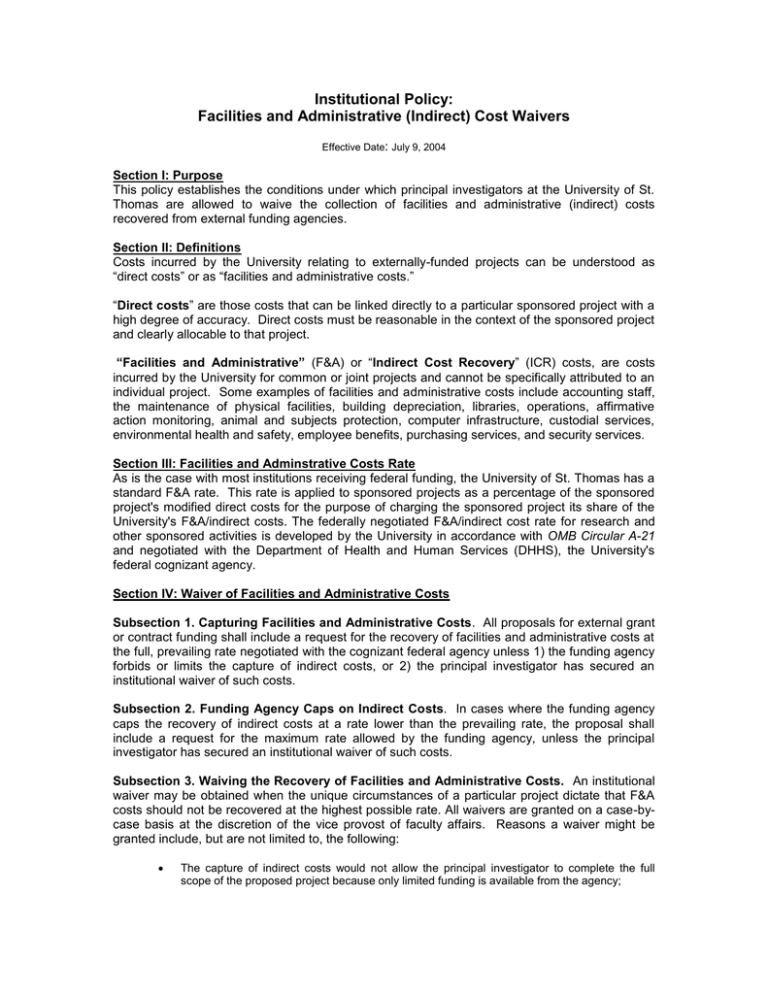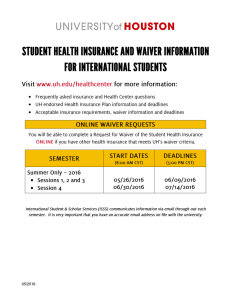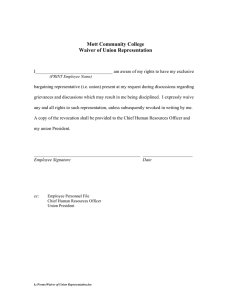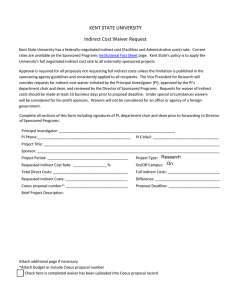Facilities and Administrative (Indirect) Cost Waivers
advertisement

Institutional Policy: Facilities and Administrative (Indirect) Cost Waivers Effective Date: July 9, 2004 Section I: Purpose This policy establishes the conditions under which principal investigators at the University of St. Thomas are allowed to waive the collection of facilities and administrative (indirect) costs recovered from external funding agencies. Section II: Definitions Costs incurred by the University relating to externally-funded projects can be understood as “direct costs” or as “facilities and administrative costs.” “Direct costs” are those costs that can be linked directly to a particular sponsored project with a high degree of accuracy. Direct costs must be reasonable in the context of the sponsored project and clearly allocable to that project. “Facilities and Administrative” (F&A) or “Indirect Cost Recovery” (ICR) costs, are costs incurred by the University for common or joint projects and cannot be specifically attributed to an individual project. Some examples of facilities and administrative costs include accounting staff, the maintenance of physical facilities, building depreciation, libraries, operations, affirmative action monitoring, animal and subjects protection, computer infrastructure, custodial services, environmental health and safety, employee benefits, purchasing services, and security services. Section III: Facilities and Adminstrative Costs Rate As is the case with most institutions receiving federal funding, the University of St. Thomas has a standard F&A rate. This rate is applied to sponsored projects as a percentage of the sponsored project's modified direct costs for the purpose of charging the sponsored project its share of the University's F&A/indirect costs. The federally negotiated F&A/indirect cost rate for research and other sponsored activities is developed by the University in accordance with OMB Circular A-21 and negotiated with the Department of Health and Human Services (DHHS), the University's federal cognizant agency. Section IV: Waiver of Facilities and Administrative Costs Subsection 1. Capturing Facilities and Administrative Costs. All proposals for external grant or contract funding shall include a request for the recovery of facilities and administrative costs at the full, prevailing rate negotiated with the cognizant federal agency unless 1) the funding agency forbids or limits the capture of indirect costs, or 2) the principal investigator has secured an institutional waiver of such costs. Subsection 2. Funding Agency Caps on Indirect Costs. In cases where the funding agency caps the recovery of indirect costs at a rate lower than the prevailing rate, the proposal shall include a request for the maximum rate allowed by the funding agency, unless the principal investigator has secured an institutional waiver of such costs. Subsection 3. Waiving the Recovery of Facilities and Administrative Costs. An institutional waiver may be obtained when the unique circumstances of a particular project dictate that F&A costs should not be recovered at the highest possible rate. All waivers are granted on a case-bycase basis at the discretion of the vice provost of faculty affairs. Reasons a waiver might be granted include, but are not limited to, the following: The capture of indirect costs would not allow the principal investigator to complete the full scope of the proposed project because only limited funding is available from the agency; The proposal would be more competitive if higher levels of cost sharing in the form of waived ICR were committed to the project; The proposal represents a strategic investment and seeks seed funding for a project that may lead to future external funding and even greater F&A cost recovery; The proposed award is small – under $5,000. Subsection 4. Process for Obtaining a Waiver. The principal investigator of a grant or contract proposal must submit a request for a waiver in writing at least 5 days prior to submission of the proposal. The request must include the following: Rationale for the waiver, including information on the impact on the project and the project’s budget if the waiver is not granted; Project Title; Name of the Funding Agency; Due Date for the Proposal; Complete Budget, Including Agency Request and All Institutional Matching Funds. The request must be signed by the principal investigator and either the director of the appropriate routing office (the GRO or Corporate and Foundation Relations), and is approved only upon the signature of the vice provost of faculty affairs. Subsection 5. Non-Compliance. If a proposal is submitted to the Grants and Research Office or Corporate and Foundation Relations for submission to an external funding agency and a request for a waiver has been submitted but is still under consideration, the GRO or Corporate and Foundation Relations will process the proposal and document the fact that the waiver was under consideration at the time of submission. If a waiver has not been requested, the GRO or Corporate and Foundation Relations will still process and submit the proposal, but no award will be established or sponsored account set up until the principal investigator has submitted a written request for a waiver as per Subsection 4 and this request has been approved.



